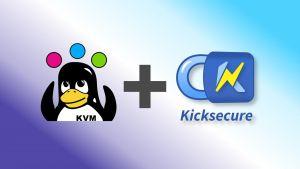Kicksecure for KVM
| About this KVM Page Contributor maintained wiki page. | |
|---|---|
| Support Status | stable |
| Difficulty | medium |
| Contributor | HulaHoop |
| Support | Community support only! |

unofficial logo re-design for the KVM
 virtualizer + Kicksecure
virtualizer + KicksecureThis is the KVM flavor of the Kicksecure project.
Introduction
[edit]Much of the warnings and use case instructions from Whonix KVM, such as running the OS headlessly![]()
or using shared folders
![]()
, are applicable.
For more details about Kicksecure, check Kicksecure pages.
Support tickets should be forwarded to the KVM subforum![]()
.
Build from Scratch
[edit]Advanced users are encouraged to build Kicksecure images for high security assurance.
Download Kicksecure
[edit]GUI
stable LXQt
Optional: Digital signature verification.
Version (stable): 18.0.8.7
Only experienced users: This step is only useful and recommended for very experienced users. All other user please skip this step.
- Digital signatures are a tool enhancing download security. They are commonly used across the internet and nothing special to worry about.
- Optional, not required: Digital signatures are optional and not mandatory for using Kicksecure, but an extra security measure for advanced users. If you've never used them before, it might be overwhelming to look into them at this stage. Just ignore them for now.
- Learn more: Curious? If you are interested in becoming more familiar with advanced computer security concepts, you can learn more about digital signatures here: Verifying Software Signatures
Read Verify the images to learn more about the verification process for the images.
testers LXQt
Optional: Digital signature verification.
Version (testers): 18.0.8.7
Only experienced users: This step is only useful and recommended for very experienced users. All other user please skip this step.
- Digital signatures are a tool enhancing download security. They are commonly used across the internet and nothing special to worry about.
- Optional, not required: Digital signatures are optional and not mandatory for using Kicksecure, but an extra security measure for advanced users. If you've never used them before, it might be overwhelming to look into them at this stage. Just ignore them for now.
- Learn more: Curious? If you are interested in becoming more familiar with advanced computer security concepts, you can learn more about digital signatures here: Verifying Software Signatures
Read Verify the images to learn more about the verification process for the images.
CLI
stable CLI
Optional: Digital signature verification.
Version (stable): 18.0.8.7
Only experienced users: This step is only useful and recommended for very experienced users. All other user please skip this step.
- Digital signatures are a tool enhancing download security. They are commonly used across the internet and nothing special to worry about.
- Optional, not required: Digital signatures are optional and not mandatory for using Kicksecure, but an extra security measure for advanced users. If you've never used them before, it might be overwhelming to look into them at this stage. Just ignore them for now.
- Learn more: Curious? If you are interested in becoming more familiar with advanced computer security concepts, you can learn more about digital signatures here: Verifying Software Signatures
Read Verify the images to learn more about the verification process for the images.
testers CLI
Optional: Digital signature verification.
Version (testers): 18.0.8.7
Only experienced users: This step is only useful and recommended for very experienced users. All other user please skip this step.
- Digital signatures are a tool enhancing download security. They are commonly used across the internet and nothing special to worry about.
- Optional, not required: Digital signatures are optional and not mandatory for using Kicksecure, but an extra security measure for advanced users. If you've never used them before, it might be overwhelming to look into them at this stage. Just ignore them for now.
- Learn more: Curious? If you are interested in becoming more familiar with advanced computer security concepts, you can learn more about digital signatures here: Verifying Software Signatures
Read Verify the images to learn more about the verification process for the images.
Decompress
[edit]Use tar to decompress the archive.
tar -xvf Kicksecure*.libvirt.xz
Do not use unxz! Extract the images using tar.
Importing Kicksecure VM Template
[edit]The supplied XML files serve as a description for libvirt and define the properties of a Kicksecure VM and the networking it should have.
1. Kicksecure works with the network named default out of the box.
2. Import the Kicksecure image.
virsh -c qemu:///system define Kicksecure*.xml
Moving the Kicksecure Image File
[edit]The XML files are configured to point to the default storage location of /var/lib/libvirt/images. The following steps move the images there so the machines can boot.
Note: Changing the default location may cause conflicts with SELinux, which will prevent the machines from booting.
It is recommended to move the image file instead of copying it.
sudo mv Kicksecure*.qcow2 /var/lib/libvirt/images/Kicksecure.qcow2
Shared Folders
[edit]See KVM, Shared_Folders![]() .
.
Footnotes
[edit]

We believe security software like Kicksecure needs to remain Open Source and independent. Would you help sustain and grow the project? Learn more about our 13 year success story and maybe DONATE!

















